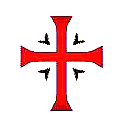Albanian Orthodox Church
 The tribal organization in northern Albania as late as the early 20th Century was an interesting survival of the earliest form of social combination; it may be compared in many respects with that which existed in the Scottish highlands in the time of the Stuart kings. The practical autonomy which the Gheg mountaineers enjoyed was won by a prolonged and successful resistance to Turkish domination; as a rule they payed no taxes, they were exempt from the conscription, they knew nothing of the Ottoman law, and the few Turkish officials established amongst them possessed no real authority. Their only obligation to the Turkish government was to furnish a contingent in time of war.
The tribal organization in northern Albania as late as the early 20th Century was an interesting survival of the earliest form of social combination; it may be compared in many respects with that which existed in the Scottish highlands in the time of the Stuart kings. The practical autonomy which the Gheg mountaineers enjoyed was won by a prolonged and successful resistance to Turkish domination; as a rule they payed no taxes, they were exempt from the conscription, they knew nothing of the Ottoman law, and the few Turkish officials established amongst them possessed no real authority. Their only obligation to the Turkish government was to furnish a contingent in time of war.
The great majority of the Albanians, probably more than three-fifths, are Moslems. In the early 20th Century the Orthodox Church had metropolitans at Prizren, Durazzo, Berat, Iannina and Kortcha; the Bulgarian exarchate maintained a bishop at Dibra. Of the Albanians in Sicily the great majority (44,701) remained faithful to the Greek Church; in Italy 116,480 follow the Latin ritual, and 38,192 the Greek.They were, of course, the same group which formerly emigrated into Italy, and whose descendants formed the majority of the Italian Greek Catholics. All the Albanians in Greece belong to the Orthodox Church. Although they use the Greek language in their liturgy and have attended the Hellenic Orthodox Church, they have no love for the Greeks.
The churches of this communion represented what is held to be the oldest existing race in Europe, the descendants of the Macedonians, Illyrians, and Epirotes, who were the offspring of tho Pelasgians. The varied invasions by Romans, Goths, Huns, Serbs, Bulgars, Normans, and Turks have made little change in social customs, language, or traditions, and the present day Albanians represent their early ancestors more exactly, probably, than does any nation in Europe. They are noted for their independence, persistence, strong sense of honor, caution, hospitality, respect for womanhood, bravery, loyalty, and keen appreciation of poetry; and have produced some of the most noted leaders of history: Alexander the Great, Pyrrhus, Scanderbeg, Ali Pasha of Janina, Mehmet Ali Pasha of Egypt, the Italian statesman, Crispi, and others.
The Albanian language belongs to the Indo-European group, is older than the classical Greek, has many literary qualities, and is of great interest to scholars. The early religion of the Albanians had many features older even than the earliest traces of the ancient Greeks and Romans. Christianity reached them in the first century, but made little progress until the fourth. They were under the jurisdiction of the Greek Patriarchate of Constantinople, which refused the use of Albanian vernacular in the services, with the result that the church had little hold on them; and when the Turks came, their conception of power and their military character appealed to the mountaineers, and the great majority became Moslem. In the north and south along the Adriatic, portions became Christian, those in tho north, termed Gheg, being connected with the Roman Catholic Church, and those in the south, termed Tosk, with the Greek Church. At present about two-thirds of the Albanians are Moslem, and the remaining one-third are about equally divided between Tosk (Greek) and Gheg (Roman Catholic). Both spiritually and ceremonially there is much in common between the three classes.
The Albanians used the Greek language in their liturgy, there having been no version into their very difficult tongue. They are also known as Arnauts and call themselves in their own language skipetar, "mountaineers".
They came to America from Albania in the southern Balkans and from Epirus and northern Greece. Albanian immigration to America has been quite recent, but by around 1910 there were some 15,000, mostly settled in the vicinity of New York City and in New England.
Soon it was perceived, however, that no progress could be made among the Orthodox Albanians who constituted the bulk of the emigrant population, on account of the interference of the Greek Patriarch of Constantinople who had interdicted the use of the Albanian language by a decree of excommunication. If those Christians who were living in the United States dared to ignore the decree of the Patriarch, their families in Albania would suffer the direful consequences of the excommunicationl As a result, the leaders of the movement hit upon the idea of cutting once for all the religious ties thai bound the Orthodox Albanians to the Greek Patrit archate of Constantinople. Consequently, in 1908 a peaceful religious revolution took place. A Convention was held in Boston, which proclaimed the religious independence of the Orthodox Christian Albanians, and instituted an independent Albanian Orthodox Church.
This peaceful revolution had momentous consequences. The dread of excommunication was done away with, and the Christian Albanians flocked into the ranks of the nationalists. Shortly after, throngs of Moslem Albanians arrived in the United States; they felt so pleased at the action of their Christian brethren that they not only separated themselves from the religious head of Islamism, the Sheikh-ulIslam of Constantinople, but they also made liberal contributions to the Christian Albanian Church.
|
NEWSLETTER
|
| Join the GlobalSecurity.org mailing list |
|
|
|

